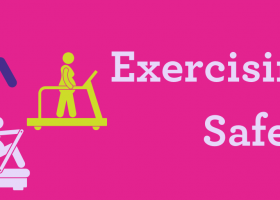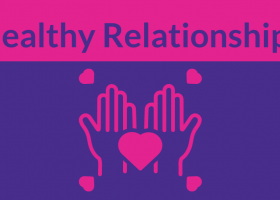Eating Right for Your Body

There’s a lot to think about when it comes to eating right for your body. It’s more than just the foods you eat. Eating healthy also means not skipping meals, eating the right portions, and drinking enough water.
Tips for Healthy Eating
1. Eat balanced meals throughout the day
- Don’t skip meals. Keep your body feeling good and your energy up by eating 3 light meals with healthy snacks in between. Skipping meals and getting too hungry will make you more likely to choose unhealthy foods later on.
- Eat breakfast. Eating breakfast will give you energy to start your day. It wakes up your brain and your body. It also helps you not overeat later in the day. Choose something low in sugar.
2. Don’t eat too much sugar
- Avoid drinking sugary drinks. Sugary drinks like pop and energy drinks have a lot of calories and the sugar will make you hungry again faster. The more sugar you eat or drink, the more your body craves. Instead, drink water, diet sodas, or sugar-free drink mixes. Water is almost always the best option. You can squirt in a little lemon or other fruit if you need flavor.
- Limit sugary treats. Foods such as cakes, cookies, and candies have lots of sugar. Have these foods once in a while as a treat. Eat them in small amounts. Instead, try to buy sugar-free versions of your favorite desserts. Cook with less sugar than suggested in the recipe. Also try replacing processed sugar with honey, 100% pure maple syrup, or agave.
3. Cut down on fat
Your body only needs a small amount of fat to be healthy. Eating too many fatty foods can lead to weight gain and serious health problems in the future.
To trim the fat, try some of these tips:
- Bake, steam, boil or grill your foods. Don’t fry them.
- Look for lean meats such as ground sirloin, ground beef, or round steak. For an even healthier version, try ground turkey instead of beef. Foods like beans and tofu also have the protein that your body needs.
- Drain the fat after cooking meat and wipe it down with a paper towel. This gets rid of added fat.
- Try to use less oils and fats when cooking, like butter, lard, or shortening.
4. Drink water
- Drink about 6-8 glasses of fluids. Water is best.
- If you drink juice, choose 100% juices, not juice drinks which have a lot of added sugar.
- Choose low sodium soups or vegetable juice.
5. Make sure you’re getting enough of the vitamins and nutrients your body needs
- Take a multivitamin or supplement. You may want to take a supplement if you find that you aren’t getting enough of the essential vitamins from the foods you are eating. For example, calcium or vitamin D.
- Get enough folic acid. Women need 400 mcg of folic acid every day for healthy skin, hair and nails. Folic acid is found naturally in some foods, such as leafy vegetables, citrus fruits, beans (legumes), and whole grains. You can also take a folic acid supplement. Taking folic acid before and during pregnancy can prevent birth defects in the brain and spine of a baby. Since not all pregnancies are planned it’s important to take folic acid if there is any chance you may become pregnant. These types of birth defects happen in the very early stages of pregnancy, often before a woman knows she is pregnant.
6. Be mindful
It’s easy to breeze through a meal and not pay attention to what you eat, especially when you live a busy life. You may not realize how much you eat if you eat while you are distracted. For example eating while watching TV, on the phone, or on your computer. You end up eating more food and enjoying it less.
- Slow down while you eat. Try to eat slowly so that your meals last at least 20 minutes. This gives you time to feel full. Chew slowly or count 15 chews per bite. Drink water and breathe between your bites. Set your spoon or fork down between bites.
- Eat for the right reasons. Eat when you’re actually hungry. Ask yourself, “Am I eating because I’m hungry, or because I’m stressed, angry, sad, or bored?” Try drinking a glass of water and see if you still feel hungry.
- Enjoy your food. Notice how good the food taste as you eat it. Taste all the different flavors.
Here is a guide from ChooseMyPlate.gov with information on how to make healthy food choices.
It can be exciting knowing that you are now eating for two. But “eating for two” really means eating only an extra 300 calories a day. That is about the same as eating one extra bowl of cereal or just half of a turkey and cheese sandwich per day.
You should also be thinking about the kinds of foods that you are eating. The food you put into your body is a direct link to your health. You want the best for your baby. Healthy eating is one of the best ways to give your baby a great start before he is even born.
How Healthy Eating Helps You and Your Baby
While pregnant, eating healthy can:
- Help normal growth and progress for your baby
- Help your baby have a normal birth weight
- Lower the chances of a premature birth
- Lower the risk of difficulties during pregnancy
- Give you more energy through your pregnancy
- Help with healthy weight gain during pregnancy
- Help your body defend against being sick
- Help you to avoid gestational diabetes (diabetes that happens while you are pregnant)
- Help you avoid high blood pressure during pregnancy
- Help avoid heartburn, constipation, and nausea while you’re pregnant
Folic Acid
Want to do something easy and fast each day to help insure your babies will be born healthy? Take 400 mcg of folic acid every day.
You can find folic acid in:
- Your prenatal vitamins or in folic acid supplements
- Leafy green vegetables (spinach, collard greens, and kale).
- Enriched orange juice, grains, and cereals (make sure to check the nutrition label).
Taking folic acid before and during pregnancy can help prevent birth defects. These birth defects are called spina bifida and anencephaly (underdeveloped brain). These serious conditions happen when a baby’s brain and spinal column do not form correctly in the womb.
Pregnancy Weight Gain
A lot of people think you should “eat for two” while you are pregnant, but it turns out it’s not that simple. You should only be eating an extra 300-500 calories each day – equivalent to a few extra snacks or second helping at a meal. These extra calories should come from healthy foods like low fat yogurt, fruits, and whole grains. Eating too many extra calories can make you gain unnecessary weight that will be hard to lose after delivery, and could put future pregnancies at higher risk.
Every woman’s weight gain during pregnancy is different. How much weight you need to gain depends on many things. These include your pre-pregnancy weight, your health, and your body mass index, or BMI (you can use this BMI calculator from the CDC to figure out your BMI). Remember, BMI is not always the most accurate indicator of health. Work with your doctor to decide what’s right for you.
Here are some general guidelines for pregnancy weight gain:
|
Pre-pregnancy weight |
Recommended pregnancy weight gain |
| Underweight (BMI less than 18.5) | 28 to 40 pounds |
| Normal weight (BMI 18.5 to 24.9) | 25 to 35 pounds |
| Overweight (BMI 25 to 29.9) | 15 to 25 pounds |
| Obese (BMI 30 or more) | 11 to 20 pounds |
Healthy Eating for the Family
You are the head chef and the role model. Healthy eating in your home starts with you. It is your choice what foods to buy and what meals to cook. Give your kids a head start by including healthy foods in their meals.
5 tips to help your family eat healthy:
1. Eat together as a family.
- Family meals are a chance for you to catch up with your children. Even if you’re busy most of the time, set aside a few days to sit down together and eat.
- Having meals as a family helps fight obesity and can improve your child’s school performance.
- Teens that have meals with their family are less likely to smoke, drink alcohol, or use marijuana and other drugs.
2. Offer healthy foods and snacks.
- You want to make it easy for your children to choose a healthy snack. Have them ready and available. Some examples of healthy snacks include:
- Slices of fruit
- Whole wheat crackers and cheese
- Vegetables (like baby carrots or cucumbers) and dips, such as hummus
- Celery and peanut butter
- Low sodium Popcorn
- Low fat yogurt
- Buy whole grain bread and cereals, low fat yogurt, milk and cheese, and lean meats.
- Try to add fruits and vegetables into every meal. Try adding fruit to your desserts, tomatoes to a sandwich, or vegetables in your pasta.
- Serve fresh, frozen, and canned fruits and vegetables. They all count when trying to get your 5 daily servings of fruits and veggies!
- Drink 100% fruit juices with no added sugar. This is a good way to get a serving of fruit each day.
- Save treats like cookies and candy for special occasions.
3. Set a good example.
- The best way to encourage your children to eat well is to have healthy meals yourself. Children want to be like their parents. Be a role model by eating healthy too.
4. Avoid battles over food.
- Avoid bribing or rewarding your children with food.
- For the most part kids know when they are full and when they are hungry. Try not to force your kids to finish their plate of food.
- Try to give your children some control over the foods they eat. You can still limit the types of food that is in your home. For example, ask them if they want to have broccoli or green beans with dinner. Let them choose what type of cereal they want between 3 options that you pick. This will help them practice making healthy food choices.
5. Involve your children in preparing meals.
- Brainstorm with your children about what types of food they want for lunch or dinner.
- Go to the grocery store together to shop for healthy foods. This is a great chance to teach your children how to read a nutrition label or about spending money wisely.
- Let your children help you prepare meals by choosing age appropriate tasks in the kitchen. For example, washing or peeling vegetables or stirring a pot.
Seems like every way you turn there are things that need to get done, places you want to go and things you want to do. You’ve got what it takes to do it all – eating right will give you the energy boost you need to take it all on!
Even when you are on the go, there are things you can do to eat right and keep that energy flowing. It’s all about choices and planning ahead. Below are some tips for eating healthy while you move full speed towards your destiny.
Feeding Your Body Right on the Go
In the Grocery Store
Making smart choices in the grocery store will be easier if you go in with a plan. Planning your meals ahead of time and going shopping with a list will help make it easier to buy the right foods to help you eat right.
Some tips for choosing healthy foods at the grocery store:
- Look for whole grains, fresh vegetables and fruits, low fat milk, and lean meats.
- Buy less pre-made foods, snack foods, and processed foods.
- Check the label. Avoid foods with a long list of ingredients. Limit foods with large amounts of high-fructose corn syrup and other added sugars. The simpler the ingredients, the better it is for you.
- Check that canned fruit and vegetables are in unsweetened liquid, not heavy syrup.
- Watch your portions. Nutrition labels can be tricky when the calories per serving on the food label seem low but there are a lot of servings in the package. You can learn more about how to read a nutrition label in the article, “How to Read Food and Beverage Labels”.
At a Restaurant
Some restaurants will mark healthy choices on their menus. Others put the calories right next to the food options. There will always be temptations, but pay attention to these clues to help choose a healthy meal.
- Cooking matters. Order steamed, grilled, or broiled dishes instead of those that are fried or sautéed in oil.
- Extras add up. Skip the cheese, bacon, and mayonnaise on your burger or sandwich.
- Eat light. Choose a salad and ask for the dressing on the side.
- Substitute. Pick a light vinaigrette instead of a cream dressing. You can add grilled chicken, salmon or shrimp to a salad to make it more filling.
- Mind your sides. Instead of fries, try a side salad, fruit, baked potato, or greens.
- Avoid temptation. Order an item from the menu instead of the “all-you-can-eat buffet.” This will help you to eat less food.
- Portions, portions, portions. Ask for half of your meal wrapped to go. Or plan on eating only half of what’s on your plate. Restaurant portions are usually much bigger than one meal.
At a Fast Food Restaurant or Drive Thru
We’re all in a hurry sometimes, and who doesn’t have a favorite quick bite? Try to plan your meals so that you don’t feel the pressure to pick up a fast meal as often. Stepping back a fast food habit can be hard, start by going a few times less each week. When you do go, choose places that offer healthier options, such as sandwiches or salads.
To cut fat and calories from your meal:
- Some restaurants have their nutritional information on their menus (or will give you a list if you ask for it). Look for items lower in calories, fat, and sodium (salt) to help you make smart choices.
- Order the smallest hamburger or sandwich on the menu (a junior or kids’ size). Leave off the cheese, mayonnaise, and “special sauce.” Or take off half the bun.
- Get lean meat (turkey, chicken, roast beef) on your sandwich. Ask for chicken or fish to be broiled or grilled instead of fried.
- Pick pizza with thin crust and vegetables.
- Get baked chips instead or regular chips or fries.
- Skip fried foods like battered fish, onion rings, egg rolls, or fried tacos.
- Share your meal with a friend or family member.
Tips for Dad
Eating healthy is something that is good for the whole family, not just for Mom and baby. You can help your partner by setting a good example and choosing healthy foods along with Mom.
- Choose to drink water over pop and drink plenty of it. If Mom gets too dry, it can lead to early labor so help by bringing her water or carrying a water bottle when you are together.
- Choose grilled or baked over fried. Fried foods may taste great, but all that extra oil is not good for you and can lead to health problems.
- Choose healthy snack foods. Instead of eating chips or cookies, try a banana with peanut butter, whole wheat crackers and cheese, or vegetables and dips.
Local Resources:
- WIC Nutritional Program Services offers food assistance to pregnant women, infants, and children who are eligible for Medicaid. You can learn more about this at a local health center.
- Corktown Health provides food vouchers, and liquid dietary supplements (Pediatric Ensure and Advera) to low-income individuals affected by HIV/AIDS.
- Gleaners Community Food Bank supplies food.
- Fertile Ground Collective is a non-profit organization based in Detroit, Michigan. It serves as a catalyst and innovator in the planning and development of urban farming through our Urban Pioneers Service Program.
- Eastern Market: is open every Saturday, and Tuesdays during the summer. You can even use your Bridge card at special vendors through the market. Also, your Bridge card has 2x the value at the market through Double Up Food Bucks.
- MI Dept. of Human Services’ Food Assistance offers temporary assistance for low-income families and individuals. Visit the link above or your local DHS office to learn more.
- Detroit Community Markets offers fresh veggies and fruits at their North End location and also delivers to homes in the local area.
- Keep Growing Detroit asks: Do want to learn more about urban gardening in Detroit, cooking seasonal veggies, or want to get a jump on a year’s worth of seeds and plants for just $10? Check them out!




